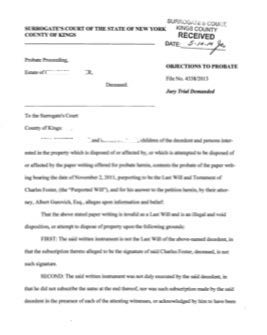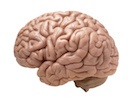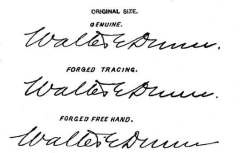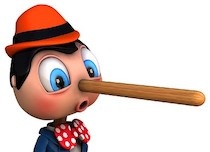Here is How a Will Contest Works and How We Can Help You Win
To contest a will, you will need to have your attorney file objections to probate of the will. Objections is a document that lists all of the potential problems with the will and asks the court to reject it. Once we file these objections with the court, your will contest is set in motion.
As an example, here is a front page of a set of objections we’ve filed for one of our clients:
In the objections, we would typically state all the possible grounds for your will contest. The typical grounds to contest a will in New York and most other states are as follows:
- Lack of mental capacity
- Undue influence
- Fraud
- Duress
- Forgery
- The will was not made correctly
While listing the basic grounds is simple, proving them in a court of law is complicated and should be left to an experienced estate attorney. So before we go further, we would just like to let you know that if you find yourself in a situation where you are figuring out how to contest a will, we at the Law Offices of Albert Goodwin are here for you. We can be reached at [email protected] or at 718-509-8774.
How We Handle Typical Will Contest Scenarios
Where the will was made by an attorney, that attorney would typically testify that he made the will at the request of the person whose name is on it and the witnesses will testify that they saw the person sign the will and declare it to be their last will and testament. After that, the will contest will focus on mental capacity and undue influence.
Where the will was made without an attorney, there is no attorney to testify that the will was made correctly, so the will contest will also deal with possible issues of the will not made correctly and not signed correctly.
Where the will has problems with the attorney or witnesses, the will contest will also focus on forgery. These problems could arise if the witnesses:
- Have a connection to the person benefitting from the will
- Are no longer living, or
- Are “sketchy,” as in suspicious or untrustworthy (you’ll know if when you see it)
Those were the three basic layout of most will contests. We are now going to go into each will contest ground with more detail.
EXPLANATION OF EACH WILL CONTEST GROUND
The Person Was Not Mentally Capable of Making the Will
Mental Incapacity – To show mental incapacity to make a will, we need to prove that the person did not understand one or more of the following:
- What they own
- Who their relatives and friends are
- What is in their will.
When contesting a will based on lack of mental capacity, you have a higher chance of success if the testator suffered from a dementia disorder, mental illness, or was in a weak physical state. The fact that the testator was taking potent mind-altering pharmaceuticals during the will execution can also play a significant role.
Dementia Disorders – There is a wide range of dementia disorders that can interfere with a person’s capacity to make a will.
- Alzheimer’s – this is the biggest cause of dementia. Early onset can start as early as the age of 40 or 50, and progresses with age. It destroys a person’s cognitive functioning and may cause them to lose the capacity to make a will.
- Vascular Dementia – often caused by a stroke, results from obstruction of blood flow to the brain
- Parkinson’s Decease – degeneration of nerves in the brain.
- Frontotemporal Dementia – deterioration and shrinkage in front and side areas of the brain
- Dementia due to head injuries
- Dementia due to HIV or medications
Changes in memory and behavior in older adults usually point to dementia. The gradual cognitive decline caused by a degenerative condition eventually results in the loss of mental capacity required to make a will. The more dementia progresses, the harder it becomes for a person to make decisions. Therefore, the later the stage of Dementia, the more likely it is for the will contest to succeed.
Mental Illness – Mental illness in and of itself does not mean that the decedent lacks capacity. In order to be successful in contesting a will, the objectant to the will is going to have to show how the mental illness played a role in the making of the will. Some examples of mental illness that can impact the capacity to make a will are:
- Depression – The will-maker feels hopeless and passive and does not care what happens to their estate. The elderly often suffer from depression towards the ends of their lives. Family conflicts relating to inheritance only exacerbate their depression.
- Paranoia – The pervasive distrust of paranoia patients can make it easier to manipulate and “triangulate” them into excluding some people from their will.
- Bipolar – Bipolar patients experience mood swings. People who manipulate those patients can exploit those mood swings in order to get the patient to change their Will.
- Schizophrenia – Schizophrenia patients experience delusions and distorted reality. People who benefit from their will can take advantage of those mental deficiencies in order to manipulate the patient into making a will bequest. More about schizophrenia here.
Personality Disorders – personality disorders do not automatically mean that the decedent lacked capacity. But they can still make a big difference in contesting a will. For example, if the person who made the will had a “Cluster C” Dependent Personality Disorder, that person can be vulnerable to having “well-wishers” unduly influence them into making a will. When using personality disorders as a factor in challenging the will, we look to symptoms such as
- excessive dependence on others
- submissive behavior
- fear to have to provide self-care
- difficulty disagreeing with others and
- tolerance of poor or abusive treatment.
Weak Physical State – We contest wills decedents who were in such a weak physical state that it can be said that their physical state adversely influenced their mental capacity.
Mind-Altering Pharmaceuticals – The fact that the decedent was taking potent mind-altering pharmaceuticals during the will execution can play a difference. When the decedent is in an altered state, they can have a significantly reduced capacity in understanding the facts of daily life, including the factors involved in making a will. Sedatives, antipsychotic and pain medications can push a person’s mental state over the edge of capacity.
“Drifting in and Out” and “Lucid Moments” – Some people, as they get older, may drift in and out, sometimes lucid and sometimes not. If you are contesting a will, you will try to win by showing that the decedent was never lucid at all, or was only lucid on rare occasions and the time of the making of the will was not one of those occasions. Those defending the will are going to say that the time of will execution was a “lucid moment.”
Some will contest lawyers and medical professionals hold the view that the “lucid moment” concept is out of date with the modern understanding of mental capacity. Their view is that since a person has no mental capacity, it doesn’t “return” to them on some occasions. However, at this time, New York courts still consider “lucid moments,” so this is an important factor to consider in New York will contests.
Circumstantial Evidence – In contesting a will, your lawyer does not have to prove that the decedent lacked capacity on the exact day of the will signing. Instead, we can use circumstantial evidence to show that the decedent lacked capacity during that time period. Obtaining Medical Records – The most effective strategy for challenging the decedent’s mental capacity is to obtain medical records from the medical providers and then go through the medical records and see if there are any notes that point to incapacity, such as evaluations from medical personnel and check for a list of Alzheimer’s or dementia medications, sedatives and antipsychotics. Different forensic and analytical tests will be used to asses the mental capacity of the person. The decedent might have been administered a Mini-Mental Exam or the Clock Test while they were still alive. After their death, when an in-person mental exam cannot be administered. But we can still try to use models of mental capacity such as PARADISE – 2 to argue that the testator had impaired brain function at the time of the events in question.Beneficiaries Manipulated the Person Into Making the Will
Undue Influence is a recurring theme in contesting a will. Beneficiaries can manipulate a person and can meddle in his or her estate plan. In legal terms, when someone pressures a person to make a will, that is called “coercion,” and when someone manipulates a person to make a will, that is called “undue influence.” We prove undue influence by showing that the decedent trusted took advantage of him and manipulated him to make the will to their benefit.It is easier to establish undue influence if the following factors are present:
- Susceptibility. The testator had a weakness (physical, mental, or financial) that made them susceptible to influence;
- Opportunity. The wrongdoer had access to the testator and an opportunity to exert influence; (e.g. taking care of testator, excluding everyone else, cutting off testator’s communication with their family and friends so that the wrongdoer can have total control of the testator)
- Active participation. The wrongdoer actively participated in drafting the will; and
- Unnatural disposition. There is an unnatural (unexpected) result.
A common law presumption of undue influence can possibly be established if:
-
Confidential relationship. A confidential relationship existed between the testator and the wrongdoer, such as
- Attorney/client
- Clergy/congregant
- Conservator or guardian/conservatee or ward
- Parent/child
- Physician or therapist/patient or client
- Active participation. The wrongdoer actively participated in the drafting the will; and
- Unnatural disposition. There is an unnatural result.
There is a strong presumption of undue influence if the testator makes a donative transfer to
- Drafter. The person who drafted the will;
- Care custodian. A care custodian of a testator who is a “dependent adult”;
- Fiduciary. A person in a fiduciary relationship with the testator, like an accountant, banker, lawyer or financial adviser.
Read more about undue influence.
Prove a Confidential Relationship – A common strategy for contesting a will based on undue influence is to prove that the person benefiting from the will had a confidential relationship with the decedent. That makes it easier to show that the person benefitting from the will was in a position of influence and had the opportunity to pressure the person who made the will. If the person benefitting from the will was in a confidential relationship with the person who made the will, then it will be easier to prove undue influence. However, this confidential relationship “power-up” does not work well when the beneficiary of the will is a relative. It only works well when the person benefitting from the will is a caretaker or other professional helping the person making the will. When that person is a non-relative, the professional or caretaker relationship of the person benefitting from the will with the will-maker can make a significant difference.Duress
Duress – To prove duress, you would have to show force and coercion. Duress is the use of force, false imprisonment, or threats to compel the testator to make the will a certain way. Duress usually comes hand in hand with other elder abuse. The abuser uses violence or the threat of violence to get a testator to change his or her will in the abuser’s favor.The Will is a Forgery
If somebody forged a part of the will and we can prove the forgery, then we can have the Surrogate’s Court declare the will to be invalid. When contesting a will, you or the expert you hire will need to be familiar with the different forgery methods. If you think that a will was forged, read our thorough article on will forgery methods and red flags.How People Forge Wills – To win based on forgery in New York, a will contestant needs to prove that someone forged the signature on a will, by either writing the signature themselves and saying that the person the purported will-maker is the author, importing the signature from another document, or manipulating the text in some other way (by manipulating, we mean replacing the pages or changing the text).
Handwriting Expert – We win forgery will contests by bringing a handwriting expert to present evidence of other handwriting samples of the deceased. The handwriting expert would compare the handwriting on the will and would say that it’s not a close enough match. The handwriting expert would also determine if the handwriting on the will belongs to someone else, such as the person benefiting from the will.
A forgery trial can easily become a battle of the experts. Getting the most presentable and authoritative expert can make the difference between winning and losing.The Beneficiaries Obtained the Will by Lying
When contesting a will based on fraud, we will need to show that the beneficiaries knowingly misled the decedent in order to make him sign the will. We do that, and the will can be overturned and declared invalid.Fraud in Factum – One type of fraud is misleading the decedent about the will itself. Beneficiaries slip a will under a guise of a different document or mischaracterize what is in the will and have the testator (maker of the will) unknowingly sign it.
Fraud in the Inducement – Another type of fraud is misleading the testator about circumstances outside of the will. The will-maker can be fed misinformation about friends and relatives or about other circumstances in their lives.
Unscrupulous individuals, especially psychopaths with narcissistic personalities, are very good at using manipulative tactics. Their favored ways of manipulating vulnerable seniors are
- Triangulating – encouraging the victim’s negative thoughts about a close person and
- Gaslighting – providing a false view of reality to the victim
Opportunistic charlatans use those techniques to manipulate trusting older adults into leaving them an unfair share of the inheritance at the expense of the vulnerable person’s family and true wishes.
The Will Was Not Made Correctly
For a will to be valid, the people involved in the will execution need to follow New York’s formal requirements. If they did not correctly execute the will, we could successfully contest that will, leading to the will being overturned and invalidated by the Surrogate’s Court. In figuring out how to contest a will, you will need to be familiar with the formal requirements of will execution.
The will need to meet the formal requirements, which are as follows:
- The person making the will has to sign the will (or direct someone else to sign their will in their presence)
- The person making the will has to sign at the end of the will, not in the middle of it.
- There needs to be two witnesses to the will
- The person making the will has to sign the will in the presence of each witness
- The person making the will must communicate to the witnesses that they are witnessing a will
- everyone has to complete the entire ceremony within 30 days of the testator’s signature
The people involved have to follow New York execution formalities. Problems come up with wills when the person does not declare the document to be their will, or the witnesses are not there or not fully there. We can use those “hiccups” to litigate a successful will contest in New York.
In the modern world where there is little place for ceremony, it is interesting to see how ceremony, procedure and something remarkably close to tradition or etiquette can make or break a legal document of utmost importance.
Will Printed from the Internet vs. Attorney-Drafted Will – When a person prints out a will from the internet or fills out a store-bought form, they are playing Russian Roulette with the validity of their will. Contesting a DIY will is relatively easy. No estate attorney would testify that the will met all the requirements of a valid will execution because no attorney was involved.The Maker Revoked the Will

A person who made a will can revoke that will. All they would have to do would be to physically destroy the will or cross out their signature.
If no one can find the will, we presume that the person who made the will revoked it, unless someone proves otherwise.
The person who made the will can also revoke it by making a new Will. If the decedent made another will, and he made that other will after the one you are challenging, the later will wins. If the later will is overturned, then you would either try to contest the will before that one or leave it in place, depending on the older Will’s impact on your share of the inheritance.
We Can Combine Reasons (Grounds) for Contesting a Will
When figuring out how to contest a will, we often plead every possible ground for a New York will contest, because there are often multiple things going on that are connected. If the decedent was not well enough to make a will, then he was probably vulnerable to being misinformed or pressured to make a Will.
This strategy is called “alternative pleading.” If it looks like the decedent was not well enough to make a will, we would say that he was vulnerable to being misinformed or pressured to make a Will, due to his diminished mental state. We will also point out that whoever made the will did it in a hurry. There is less of a chance that whoever made the will had the time to evaluate the person who made it and did not have enough time to conduct the execution ceremony with all the required formalities.
It is true that in some will contest situations, an opportunity for a win can be spotted early on in the case. We can then proceed with a laser-sharp focus on a single issue. However, the most common strategy is still to plead every possible Will contest ground and see which one of them turns out to be more successful.
If you are involved in contesting a will, contact an estate attorney. You will describe the circumstances of the making of the will and air out the case. An estate attorney can determine whether the proposed objections have merit. Estate attorneys usually request a court-supervised examination of those involved before deciding whether it is worth your while to invest in a full-blown will contest.
We settle most many contests before trial. If a settlement is not possible, the sides exchange documents and information and ultimately proceed to trial, where the judge or the jury decides whether the will is valid or should be overturned.
Remedies for a Defective Will – When your lawyer is contesting a will, the court will decide at a trial whether the will is valid. The executor is not permitted to distribute the estate until the trial ends. If the court finds the will to be invalid, the court will do one or more of the following:
- Not admit the will
- Admit only a portion of the will
- Admit an earlier will in its place
- Not admit any of the wills, and distribute assets among the decedent’s relatives as if there was no will.
| Deadline Alert: | Once the will is admitted to probate, it will be too late to contest it. Act before the first hearing in the case. |
|---|
When it comes to making wills, unscrupulous people can take advantage of vulnerable individuals. Unscrupulous relatives, caretakers and so-called “friends” with ulterior motives prey on people who are physically disabled, cognitively impaired, isolated, confused and depressed. A victim of will fraud often loves, relies on, and fully trusts the person who misleads them. If you believe that someone took advantage of your loved one, you may be able to overturn their so-called “will.” This is done with the help of a lawyer through a will contest in New York Surrogate’s Court.
On the flip side, it does happen that people are wrongly accused of influencing a will-maker. Sometimes a will-maker wants to make a will a certain way on their own volition. This is why we have the court system and the New York attorneys. We practice will contests before the court every day. We strive to resolve those disagreements and let loved ones move on with their lives.
We have been involved in will contests since 2008. If you are involved in one and are wondering how to contest a Will, we will be happy to talk to you about it. You can call us at 212-233-1233 or [email protected].
Services We Offer in Contesting a Will
If you suspect that a will is defective, we can represent you in contesting it. Our fee for this service is based on an hourly basis, at $500 per hour, and we will require a retainer deposit in the amount of $5,000. In the will contest process, we will provide the following services:
- Find out the first hearing date and arrange to appear at the hearing
- Analyze your case and put together an initial strategy
- Review the purported will
- Review the petition for probate
- Review the Citation or Notice of Probate
- Open up a line of communication with the opposing counsel
- Request a copy of the attorney draftsman’s file
- Schedule depositions of the attorney-draftsman and attesting witnesses
- Schedule depositions of the person who is trying to probate the will
- Request copies of medical records from the providers
- Draft objections to the will and file with the court
- Appear at court hearings
- Research case law
- Select a jury
- Conduct settlement discussions
- Conduct trial if necessary
In will contests, our results speak for themselves:
$1 Million Settlement. Successfully obtained a $1 million settlement for our client even though medical records found the will-maker mentally fit$2 Million Settlement. We used an elective share to go around the will. The executor who is the son of the deceased from the first marriage claimed that any money he received from his father is not a part of the estate and that the father’s widow is not entitled to the funds. We utilized the law that any money transferred within a year before death is a part of the augmented estate for the purposes of calculating the elective share, and agreed on a $2 million settlement for the widow.





